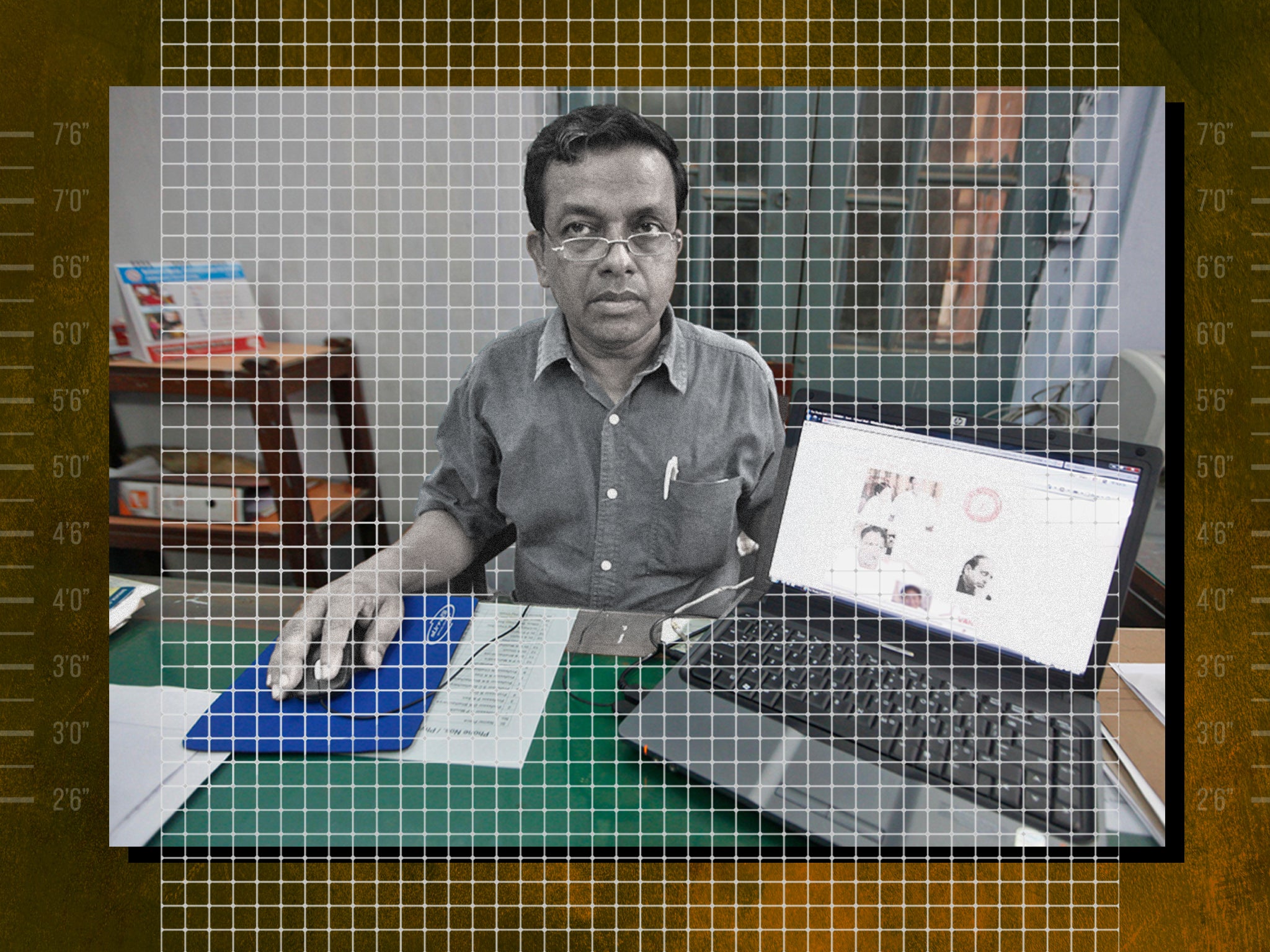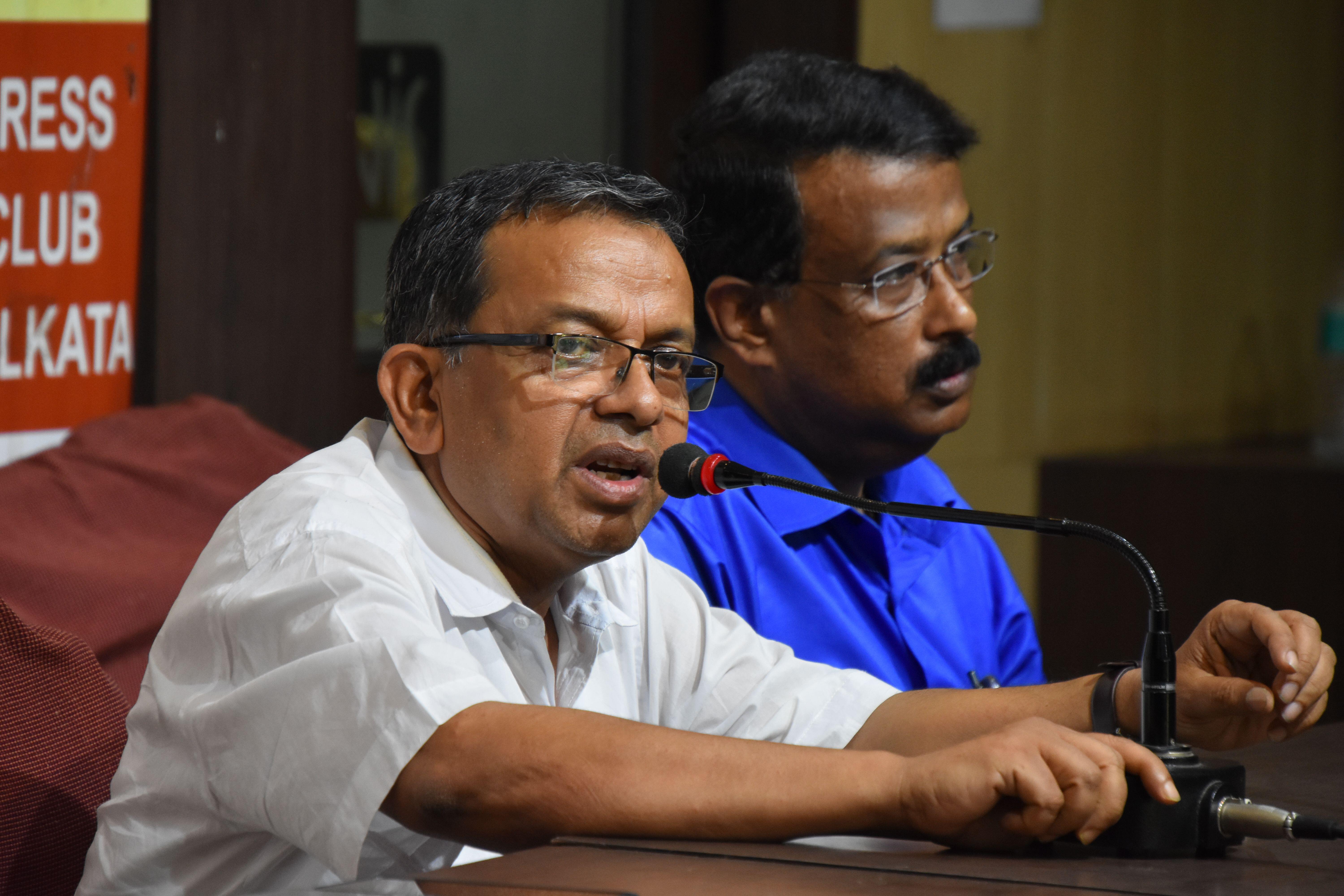He was arrested for sharing a cartoon. Eleven years later, he can finally move on
Ambikesh Mahapatra speaks to Sravasti Dasgupta about how the simple act of forwarding a mild piece of political satire saw his life ripped apart – and what it says about the dire state of free speech in India

A respected university professor arrested in 2012 for sharing a satirical cartoon – starting an extraordinary ordeal involving scores of court appearances that have turned his life upside down – has shared his relief at finally been cleared of all charges.
Ambikesh Mahapatra, a professor of chemistry at the prestigious Jadavpur University in the state capital Kolkata was arrested in April 2012 after he forwarded an email to his friends that included a cartoon containing political comment about India’s only female chief minister, the head of West Bengal state, Mamata Banerjee.
After an 11-year fight that has taken a severe toll on his life and finances, Mahapatra tells The Independent that he has suffered “long-drawn harassment” at the hands of the state government over the “innocuous” cartoon.
“The government is using different instruments to curb the constitutional rights of citizens and crush dissent, not just in West Bengal but across the country,” Mahapatra says.
Banerjee, who heads the powerful regional Trinamool Congress (TMC) party, is in her third consecutive term at the state’s helm and represents one of India’s most powerful forces of opposition to the central BJP government of the prime minister, Narendra Modi.
She has positioned herself as a challenger to Modi’s formidable political machine and often speaks out against the perceived abuses of the federal government when it comes to civil liberties and national issues. In the past week Banerjee’s party has led the chorus of opposition against the Modi government’s attempts to censor a BBC documentary on the 2002 Gujarat riots.
The cartoon shared by Mahapatra deals with the sacking of the then federal railways minister Dinesh Trivedi, from Banerjee’s TMC party, and his replacement with Mukul Roy. It plays on dialogue from Oscar-winning filmmaker Satyajit Ray’s 1974 film Sonar Kella, showing Banerjee standing with Roy and commanding the “wicked” Trivedi to “vanish”.
Banerjee appears to have taken offence at the cartoon; speaking several days after Mahapatra’s initial arrest she said it was not satire but “character assassination”.
“It was an innocuous cartoon, nothing unconstitutional – yet the state kept the case pending in court using its police personnel and by managing the judiciary,” Mahapatra says.
Describing the day he was arrested in 2012, he says he was at the office of the housing cooperative where he worked when he was accosted by a large crowd who he believes appeared to be affiliated to the TMC.

“About 70 to 80 miscreants sent by the TMC assaulted me physically in the housing society office and asked the police to arrest me and Subrata Sengupta, who was the housing cooperative secretary at the time. Under the directions of the TMC activists, [officers] took us to the police station.”
He says the TMC members forced him to write a confession statement stating that he was working for the state’s opposition Communist Party of India (Marxist) or CPI(M). “I was afraid for my life, and I wrote the confession statement on [their] directives,” he says. This “confession”, he says, later became the basis for the charges filed against him.
Mahapatra says the people who came to his office did not appear to have a copy of his email and he still does not know how they came to know about it.
Court documents state that Mahapatra was accused of sending “obscene emails, printouts and messages involving the Hon’ble Chief Minister of the State” and that he had “verbally defamed the Hon’ble Chief Minister and ‘central minister’ (Trivedi) and had used obscene language against them”.
He was first charged under Section 66A of the Information and Technology Act, a vaguely worded law making it a crime to “send offensive information using a computer or any other electronic device” that was passed in 2000 in the early days of internet use spreading in India. It carried a sentence of up to three years in prison as well as a fine, and has been used by Indian authorities at various levels to go after critics on social media.
Police also levelled charges of defamation and insulting the modesty of a woman under the Indian Penal Code, although when the final chargesheet was presented in court in June 2013, only the charges under Section 66A were present.
India’s Supreme Court finally scrapped Section 66A in 2015, yet it still took another six years for the chief judicial magistrate’s court in Alipore to discharge Mahapatra from the case on that basis. in September 2021, a delay that Mahapatra described at the time as “very mysterious”, “unjust and illegal”.
Even then, however, his ordeal was not over – the court said it was still to decide on a plea of whether to add charges for defamation and insulting the modesty of a woman [Banerjee]. Mahapatra claims the case was kept alive “under the diktats of the state government”.

Finally, last week, a higher court set aside the 2021 order and fully cleared Mahapatra of all charges.
Remarkably, there are still hundreds of cases like Mahapatra’s across India, where people are still facing prosecution by state governments on the basis of Section 66A, a law that no longer exists.
Last year a plea filed to the Supreme Court by the non-profit People’s Union for Civil Liberties (PUCL) said it had found more 800 such cases across 11 states.
Last October, the Supreme Court ordered state governments and police forces to stop prosecuting free speech on social media using the law, which the court deemed unconstitutional in a 2015 order calling it “vague” and “chilling”.
In the same year that Mahapatra was arrested, a resident of Paschim Medinipur named Shiladitya Chowdhury was arrested after he wrote online that the government was not doing enough for farmers who were dying because of rising fertiliser prices, according to a report in The Hindu.
In 2019 Priyanka Sharma, a BJP member, was arrested for sharing a picture on social media that showed Banerjee’s face photoshopped onto the body of actress Priyanka Chopra Jonas at a red carpet event.
Mahapatra was awarded compensation for his detention by West Bengal’s human rights commission in 2013 of 50,000 rupees (around £500), but he claims the state has never given him the money despite it being ordered again to do so by the Calcutta High Court in 2020.
For its part, the TMC blames Mahapatra himself for “making the case political” and describes the delay in clearing him of charges as a normal part of the “legal process”. India has an infamously slow court system with a backlog running to millions of cases, meaning charges typically take years to go to trial.
Saugata Ray, an MP for TMC, told The Independent: “The case dragged on for 11 years not because of political pressure but because the legal process took so long. Ambikesh himself made the case political as he is a CPI (M) worker. He has contested elections as well from the party.”
Ray was referring to Mahapatra’s unsuccessful bid in the 2016 assembly elections as a left-wing independent candidate who was defeated by the TMC.
Mahapatra says that while he feels a sense of relief that he has finally been discharged, instances of state abuses of power are only rising across the country.
“Such cases are not limited to [West] Bengal but happening everywhere outside the state too,” he says. “This is just one incident where justice has been served, one case only.”
Join our commenting forum
Join thought-provoking conversations, follow other Independent readers and see their replies
Comments


Bookmark popover
Removed from bookmarks